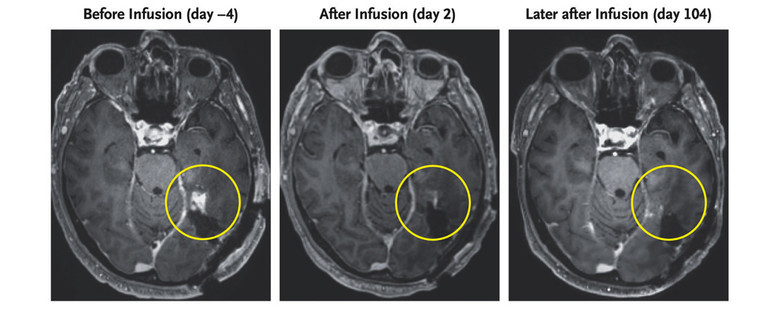Scientists said the patient beat glioblastoma after experimental therapy
[ad_1]
Scientists from the US said that the patient defeated glioblastoma after experimental therapy
Lenets_Tatsiana/Depositphotos
Researchers from the Mass General Cancer Center in the USA used experimental immunotherapy using the patient’s modified T cells in the fight against an extremely aggressive brain tumor – glioblastoma. The first positive effect appeared in a few days in a 72-year-old patient.
This type of treatment, known as CAR T-cell therapy, may be successful when other methods have failed, the scientists say. About this it is said in the results of a study published in The New England Journal of Medicine, writes Science Alert.
Glioblastoma is an aggressive type of cancer that progresses from the cells of the central nervous system – up to 95% of patients die within 5 years.
The essence of the treatment is that T-cells are removed from the patient’s blood and modified in such a way that when they return to the body, they seek out and destroy cells with cancer markers.

MRI of a 72-year-old patient with glioblastoma
NEMJ
For example, one of them is a mutated protein called epidermal growth factor receptor (EGFR), but there are other mutated cells.
Scientists tested this type of therapy on three patients with glioblastoma of the brain, in which the EGFR variant was detected.
A 74-year-old man and a 57-year-old woman were not helped by CAR treatment.
The examination showed that their tumors significantly decreased in volume during the first week of treatment, but within a month the disease began to progress again.
However, in the third patient, a 72-year-old man, the therapy helped stop the growth of the tumor.
Already on the second day after therapy, the tumor had shrunk by more than 18% and continued to shrink until it completely disappeared.
More than 150 days have passed since the beginning of the treatment and the researchers have not found any signs of the return of the disease, as well as serious side effects of the therapy. Doctors noted fever as a side effect of treatment and identified “nodules” in the lungs that appeared for a short period.
Scientists are optimistic, because they are convinced that they have reasons to continue researching a new immunotherapeutic approach.
As a reminder, in December 2023, the US Food and Drug Administration stated, that CAR-T therapy can cause cancer rather than cure it. However, oncologists denied this.
[ad_2]
Original Source Link











